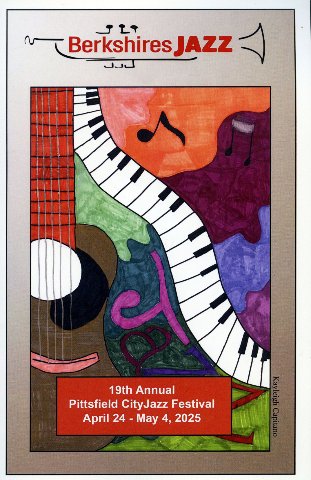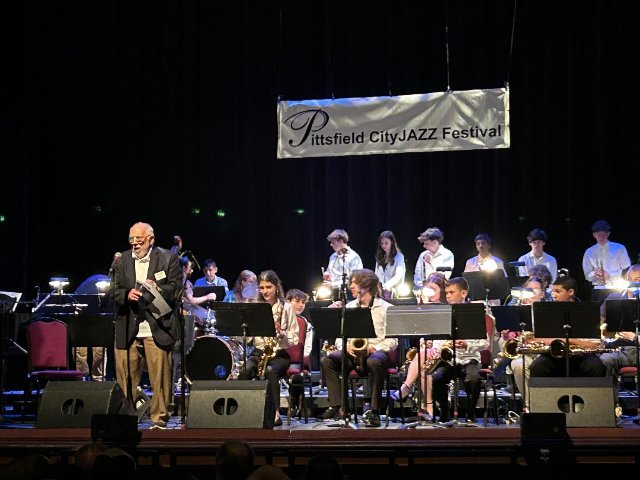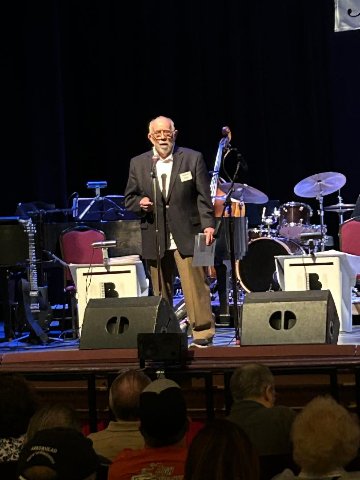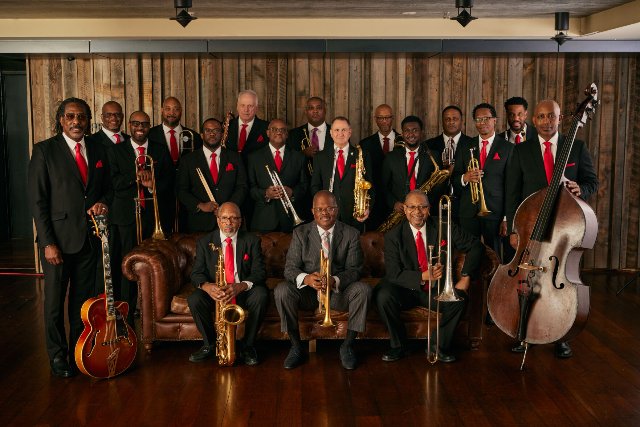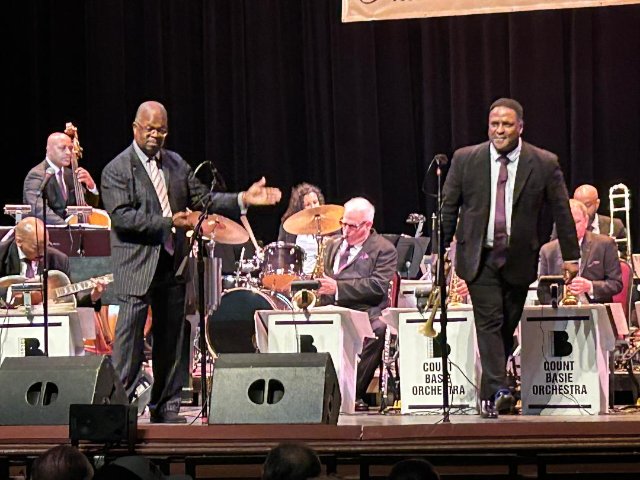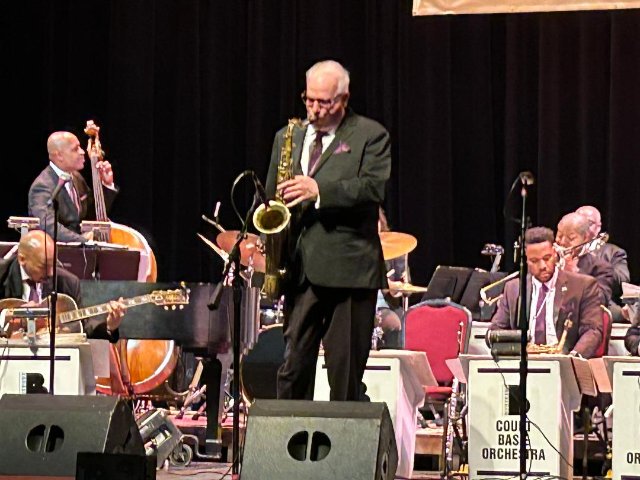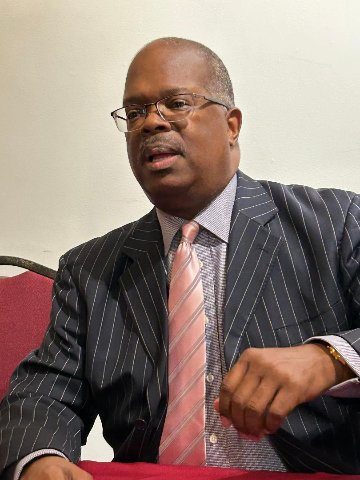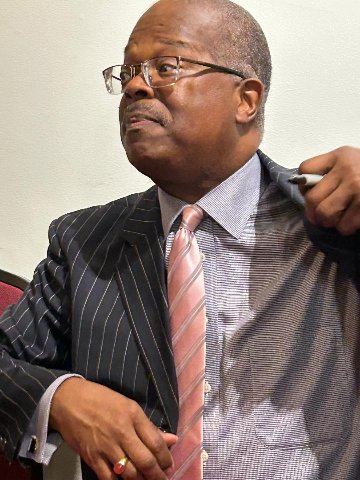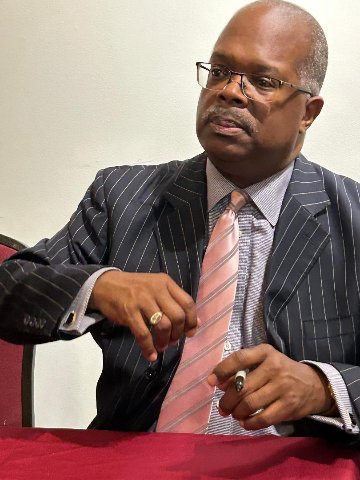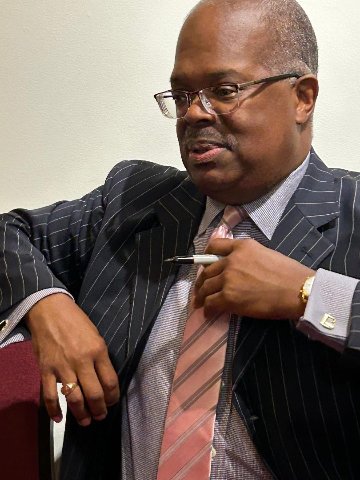Count Basie Band in Pittsfield
Headlined Pittsfield CityJazz Festival
By: Charles Giuliano - May 04, 2025
Ed Bride, who founded the Pittsfield CityJazz Festival, give or take 20 years ago, was the MC for the closing night concert event (April 24-May 4) at the Colonial Theatre. Behind him the stage was packed with The Berkshire Jazz AllStar Youth Ensemble.
Keeping jazz alive and enriching a new generation is a mandate of his organization. There was a student art contest won by Kayleigh Capitanio who created the program cover. The Jazz Prodigy Concert featured the student bass player Esteban Ruiz. Bride expressed dismay that there is not more media coverage of the week’s daily concerts and emerging artists.
His point was well taken when the ensemble performed three richly orchestrated works. The full range of young musicians was conveyed by their rendering of “Bésame Mucho,” a bolero by Consuelo Velázquez. That was followed by the Dizzy Gillespie standard ”Round Midnight.” His part was performed by a young man playing flugelhorn. In the ensemble we noted individual players with great promise.
Scotty Barnhart, trumpet, who leads the Count Basie Orchestra stated that the band in now 90-years-old and has been performing continually. The band endured after his death (1904-1984). He is a three-time Grammy winner who, after performing with the band for many years, took over as its director in 2013. In 2015 he was Executive Producer of A Very Swingin’ Basie Christmas. There have been five albums under his direction including the recent all-star Basie Rocks with Deborah Silver. Barnhart quipped that “Perhaps we’ll return with an evening of that music.”
The founding of the Count Basie Band in 1935 was an act of God. He was the young piano player in Bennie Moten’s Kansas City Orchestra. It was one of the most established Mid Western or Territory Bands. Basie joined in 1929 and evolved as co-leader and second pianist.
The band was about to go on tour but Moten first needed a routine tonsillectomy. He and his surgeon went drinking the night before. What occurred was a slip of an unsteady hand and Moten bled out on the table. Since the tour was already booked they went out.
The band tried to stay together but failed. Basie then formed his own nine-piece band, Barons of Rhythm, with many former Moten members including Walter Page (bass), Freddie Green (guitar), Jo Jones (drums), Lester Young (tenor saxophone) and Jimmy Rushing (vocals).
Based in the blues the band was noted for its “head arrangements.” Basie, who conducted from the piano with body motions, occasional grunts and nods, was a master of restraint. He would chime in with sparing, well placed chords. His primary approach was to launch solos by an amazing range of musicians including tenor sax player Lester Young, trumpet, Buck Clayton, drummer Jo Jones.
A signature of the Basie Band was its rhythm section. Bass player Walter Page was located next to the piano and Basie keyed on his beat as well as the steady and expressive drummer Jo Jones. The guitar of Freddie Green augmented their tight symmetry. Charlie Christian (1916-1942) had a similar role with Benny Goodman but was a visionary and precursor of the longer Bop lines. This genius of guitar, as was often the case with Goodman, was exploited and neglected. It is noted that Goodman “The King of Swing” never visited the hospital when Christian died young of tuberculosis
The era of the big bands slowly died after WWII and the emergence of bop in small groups. The economics of keeping bands on the road led to their demise. Finally it came down to Basie, Duke Ellington, and to some extent Stan Kenton and Woody Herman.
Through it all some 90 years on the Basie Band survives. With super musicians they perform original Basie arrangements. It’s fascinating to hear how the contemporary players so aptly cover the style of the original, legendary musicians. If you took a blindfold test it was pure Basie on stage at the Colonial.
In addition to the rhythm section, and its superb female drummer, there were five reeds, four trombones and four trumpets. There were stunning solos by all of the players.
It was a cavalcade of standards. “Corner Pocket” was composed by trumpet player Buck Clayton. Barnhart noted the recent passing of Quincy Jones before playing his arrangement of “What Kind of Fool Am I.” Apparently, Jones was a regular Basie collaborator. That transitioned to the frenetic pace of “Basie Power.”
The ballad “Lil Darlin” evoked its performance by Lambert, Hendricks and Ross. The band was always a great vehicle for singers starting with blues giant Jimmie Rushing and later Joe Williams. Last night that role was filled by the sultry Denise Thimes who sang two songs and later returned with two more. The accompaniment for the ballad “Tenderly” was stripped down to the rhythm section and a tenor solo. She displayed the finesse of timing and articulation. We heard, absorbed and were moved by every well expressed word. She makes you feel the lyrics. It’s the great jazz tradition of singer as story teller. She also performed the uptempo “I Like It.”
Barnhart described the importance of blues for the band. He asked us to imagine how Delta Blues legend Charley Patton (1891-1934) would sound with Basie. With some 70 difficult to hear recordings we know that he influenced Son House, Bukka White and Robert Johnson. What followed featured an electric guitar and music I crave to hear more of.
I thought of the great Joe Williams in “Well Allright, OK, You Win.” It’s the centerpiece of Basie’s “Live at Newport” album.
“This next one I won’t even introduce,” Barnhart said, “But they won’t let us leave town without playing it.” The audience joined in the fun of the dual ending of Basie’s greatest hit “April in Paris.”
For the finale the kids in the youth ensemble were invited to come on stage and imbibe the aura of proximity to master musicians. It was a nice way to end with a blend of past and future.

